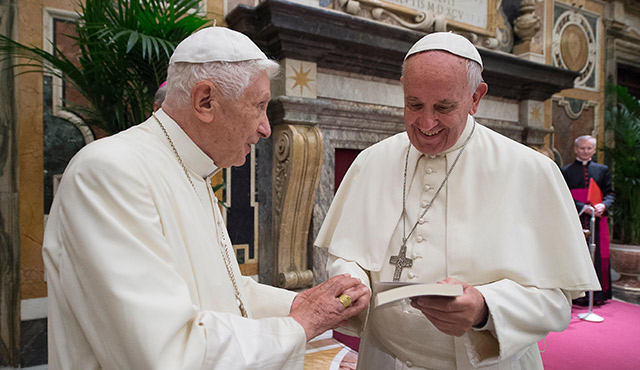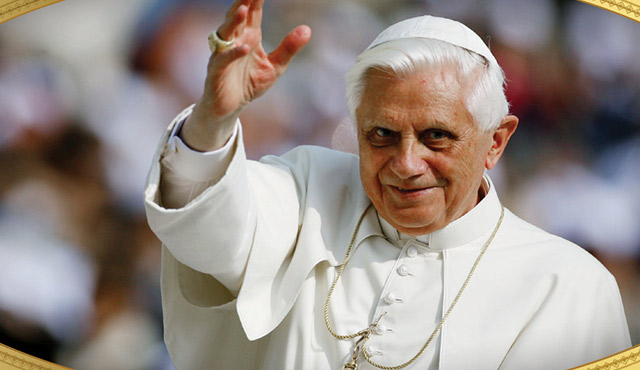Not enough people know about Joseph Aloisius Ratzinger—also known as Pope Benedict XVI.
That apathy and a lack of understanding is what OC-based author and EWTN operations manager, James Day, aims to change with his first book, titled “Father Benedict: The Spiritual and Intellectual Legacy of Pope Benedict XVI.”
An entire generation is in danger of missing Pope Benedict’s value to the spiritual life, Day believes. “I discovered Pope Benedict not long after he was elected, but I never imagined I would be writing about him,” Day tells OC Catholic. “I never had a personal connection with him, but I respected him as a Pope.”
Everything changed when Day stumbled upon Pope Benedict’s Light of the World in 2011, a book-length interview with journalist Peter Seewald. “He was talking about how being a Christian isn’t something that is parallel to your life; it needs to be one and the same…and it really hit me,” Day says. “He was more of an impetus for the rediscovery of my faith.”
Day read and studied Benedict for several more years, even after the Pope’s resignation in 2013, and became engrossed in Benedict’s theology and writings. Benedict’s Jesus of Nazareth trilogy series also moved Day to go to Confession, he says, for the first time in three years. “[Pope Benedict] spoke so accessibly to the average person, when the media and secular culture will tell you he is way above his head,” Day says.
In 2015, Day penned an article for Catholic Exchange, sharing his five must-reads from the brilliantly written works of Benedict.
The article was a huge hit, and Day soon had the idea to write a full book about the Pope—who admitted to wanting to be called “Father Benedict” after his resignation two years earlier.
Catholic publisher Sophia Institute Press picked up his offer and Day soon got to work, reading and researching for his new book. He studied and was inspired by the work of other Catholic writers, including Seewald, Paul Badde, and Father James V. Schall, S.J.
He says the writing process for ‘Father Benedict’ took him just four months. “It’s journalistic, but written from a Catholic writing for Catholics. It sets up who Benedict is, his vision for the Church and the world, and the big thing he was always up against—relativism—within the Church, doctrine, clericism, and society. It was counter-cultural.”
Addressing misconceptions between the Vatican and the modern church of the people, Day’s book takes a look at the life of a “prophet from Bavaria” who challenged secularism and promoted the New Evangelization, the Marian Way, and emphasized sacrament and scripture.
“Pope Benedict has one of the deepest and most extensive visions of God’s love and providence, which is illuminated by a philosophical and theological background unrivaled by most theologians today,” comments Rev. Robert J. Spitzer, S.J., president of the Magis Institute. “It seems that Popes are politicized, and as such, they are seen from either an ecclesiastical or political viewpoint, instead of a theological and spiritual one…defining his pontificate. People are simply not aware of what a deep guy he was,” he says.
Fr. Spitzer also believes that those who read Benedict’s encyclicals, homilies, and other written works will experience his incredibly deep spiritual vision and grounding—as well as his hopes for the universal Church.
“He had an unparalleled relationship with God. Benedict has given us a deep theological groundwork and vision…from which our Pope Francis, scholars, church leaders and us can articulate practically,” Spitzer says. “It is truth, beautiful, spiritual, and aesthetic—all of these are what Pope Benedict brings to the table.”
Both Fr. Spitzer and Day agree that Benedict also appeals to the younger generations of today, with his deep theological insight and contemplation.
“In order for young people to see the richness of Benedict, they have to value depth, to understand truth over facts, to see past the sound-byte, Instagram aesthetic world of today,” says Spitzer. “We need to appreciate a single, beautifully deep, and virtually mystical vision of God.”
All people should read Benedict because he “challenges us to be better than who we are,” Day says. The Pope’s words invite believers to look beyond their own visions and misconceptions of faith, as Day was challenged during the writing process.
Sponsored by OC Catholic Book Club, a presentation on Father Benedict, with a panel discussion and audience Q&A, will take place at Christ Cathedral’s Freed Theater on Thursday, April 27.
Panelists Fr. Spitzer, theologian Dr. Pia de Solenni, associate dean at the Augustine Institute, and author James Day will host a lively discussion on Pope Benedict XVI’s works and contributions to the enrichment of the Catholic Church.
Details of the event can be found at bit.ly/2nDt3NK.
“Benedict lives in total confidence and faith, and it was so reassuring to me. It was like having my grandfather around,” Day says. “I just want to share with people what I had learned myself—Benedict was a believer for an unbelieving world.”


